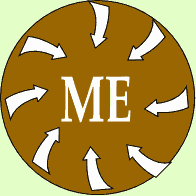I spent a while today reading a paper that Will Richardson mentioned in his latest blog. It’s called “The Right to Learn: Identifying Precedents for Sustainable Change“.
The paper talked about the need for a significant change in the essential framework of our schools, allowing learning to be self-directed, and encouraging students to follow their interests and passions.
I thought about the nature of the young child. When we were young, we played wonderful, imaginative games. We taught school to our friends or stuffed animals, pretended to be firefighters or astronauts, played doctor, put on shows where we sang or danced for our friends and family, or put a variety of seeds and plants in a bucket and made magic potions or stews. We imagined what it would be like to teach, be on stage, cook gourmet meals, and heal the sick. But tragically, this period of exploration is short-lived. By third grade (if not sooner) we have squashed that wonderful creativity that came so naturally. I could cry when I see my third graders walking around the playground bored, claiming there’s nothing to do. What have we done??
Have you ever asked a teenager what their interests or passions are? How many graduating seniors do you know that have no idea what they want to do with their lives, or what they want to study? All they know is what has been fed to them at school – They have never had the opportunity to explore or try different things, so they have no idea what their interests or passions are!
In our current system we are delivering every child an education. This amounts to feeding them a boxed lunch education that is the same for every child regardless of talent, ability, personality, interest, or background. Do we leave any time or opportunity for them to focus on the things that interest them? If we don’t give students this “right to learn”, we shouldn’t be surprised when they reach high school or college and have no idea what they want to do with their lives…
The world has changed. Facts and information are available 24/7 with a quick Internet search. Our students must know how to channel this technology, and become creative, innovative problem solvers that can make significant contributions to the new world. The boxed lunch has gone bad and is no longer nourishing. The time for change has come.
My question is this – How do we change the current framework of our schools to meet the needs of our students? What can schools do to start moving in this direction? How do we bring back the freedom to think, explore, and discover?


